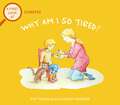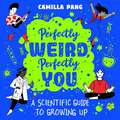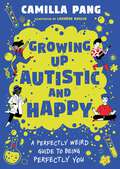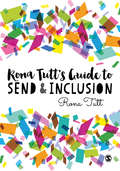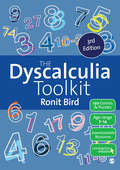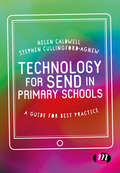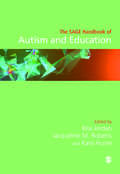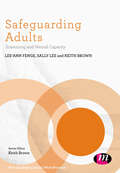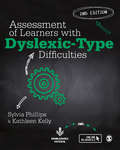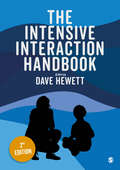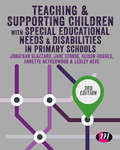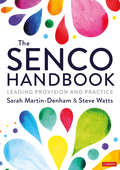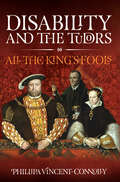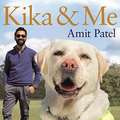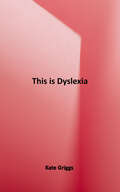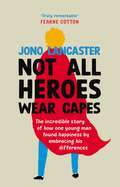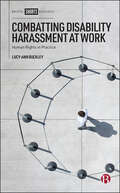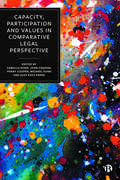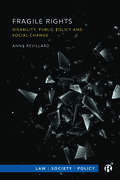- Table View
- List View
Diabetes: Why am I so tired? (A First Look At #17)
by Pat ThomasA First Look at Diabetes is a gentle introduction to what diabetes is, what the symptoms are and what can be done to control it.The superb A First Look At series consists of a number of reassuring picture books that give advice and promote interaction between children, parents, and teachers on a wide variety of personal, social and emotional issues.Notes for parents and teachers at the back of the book provide valuable advice for how to share this book with your child or class.Suitable for Key Stage 1 (ages 5-7), occasional prompts throughout the text give a chance to discuss the issue being raised.Written by trained psychotherapist, journalist and parent, and illustrated by an experienced children's book artist, this is a part of an acclaimed and successful, long-running series of picture-book non-fiction books for Early Years. Books in the series give advice and promote interaction between children, parents and teachers on a wide variety of personal, social and emotional issues. They are excellent tools for teachers to use during classroom discussions.
Perfectly Weird, Perfectly You: A Scientific Guide to Growing Up
by Camilla PangUSE SCIENCE AS YOUR GUIDEBOOK FOR GROWING UP PERFECTLY WEIRD, AND PERFECTLY YOU.Growing up, Dr Camilla Pang loved patterns and ordering things. She was obsessed with Disney, infatuated by Stephen Hawking and the language she only really understood was science. Diagnosed with autism age 8, Camilla felt like an outsider - and kids often like nothing better than to gang up on outsiders.This is the story of how Camilla used science as her sidekick for navigating the world- allowing her to translate ideas she could understand (like gravity and light waves) onto things she couldn't (like people, how long to smile for, and when someone needed a hug).Now she is sharing her scientific survival guide with you - so you can grow up with the courage to be yourself, no matter how different you feel or how hard you might find it to connect. Because the hard bit of growing up isn't other people - their opinions, their friendship groups, their popularity, their exam results. No, the hard bit is you: learning who you are as a person, having confidence in your own instincts, and understanding what actually makes you happy. And the really hard part is accepting that it's completely normal to be perfectly weird.(P) 2022 Hodder & Stoughton Limited
Growing Up Autistic and Happy: A Perfectly Weird Guide to Being Perfectly You
by Camilla Pang'I definitely feel better about myself, about being me, after reading this book.' - 11-year-old reader, ToppstaDiscover how scientific concepts can help navigate everyday human interactions, and help you grow up to be your HAPPIEST YOU!As a child, Camilla loved patterns and putting things in order. She was obsessed with Stephen Hawking, and the only language she really understood was science. Diagnosed with autism aged 8, Camilla saw the world very differently.But with science as her sidekick, she was able to translate ideas she could understand, such as photosynthesis and algorithms, onto things she couldn't, such as dealing with emotions and finding your voice. In this unique and brilliant book, Camilla shares her scientific survival guide to growing up, helping young readers navigate the world around them, giving them the courage to grow up perfectly happy in who they are.
Rona Tutt’s Guide to SEND & Inclusion
by Rona TuttHow to give children and young people who have SEN and disabilities (SEND), the support they need in the environment where they feel most fully included, should be a key concern of every teacher and practitioner. Drawing on her years of experience and conversations with a range of professionals, as well as the thoughts of children, young people and families who have encountered a number of settings, SEND expert Dr Rona Tutt examines both the benefits of the recent SEND reforms and also the opportunities that have been missed to meet needs more flexibly. Content focuses on: Creating a climate where all children can thrive An appreciation for the variety of innovative ways school leaders are meeting the needs of students A consideration of the wider context of SEN from local to national level Clear and accessible, this is an inspiring read for anyone concerned with how individual needs are best met, rather than where their education takes place.
The Dyscalculia Toolkit: Supporting Learning Difficulties in Maths
by Ronit BirdThe new edition of the bestselling Dyscalculia Toolkit continues to meet the needs of specialist and non-specialist teachers working with learners aged 6 to 14 years, who have difficulty with maths and number. Now with over 200 activities and 50 games, new and improved illustrations, and an expanded list of recommended readings, useful websites & resources, the new edition also includes exclusive access to a brand new companion website which features; - 10 videos with over 45 minutes of material demonstrating a selection of games from every section - Editable pupil tracking sheets organised by teaching point and section - Over 70 pages of downloadable and printable teaching materials including activity sheets, game boards, teaching resources & summary tables. Packed full of practical, creative and innovative ideas and strategies this is the complete toolkit to help teachers and parents support learners with dyscalculia or those struggling with mathematics.
The Dyscalculia Toolkit: Supporting Learning Difficulties in Maths
by Ronit BirdThe new edition of the bestselling Dyscalculia Toolkit continues to meet the needs of specialist and non-specialist teachers working with learners aged 6 to 14 years, who have difficulty with maths and number. Now with over 200 activities and 50 games, new and improved illustrations, and an expanded list of recommended readings, useful websites & resources, the new edition also includes exclusive access to a brand new companion website which features; - 10 videos with over 45 minutes of material demonstrating a selection of games from every section - Editable pupil tracking sheets organised by teaching point and section - Over 70 pages of downloadable and printable teaching materials including activity sheets, game boards, teaching resources & summary tables. Packed full of practical, creative and innovative ideas and strategies this is the complete toolkit to help teachers and parents support learners with dyscalculia or those struggling with mathematics.
Technology for SEND in Primary Schools: A guide for best practice
by Ms Helen Caldwell Steve Cullingford-AgnewWith so many new education technologies being developed and made available to schools, how do teachers ensure they select resources that enhance inclusive teaching in the classroom? How can you make sure new technologies are integrated into every day teaching? This new text supports trainee and beginning teachers to harness the power of technology to make their classrooms truly inclusive. It helps you make informed selections of new technology and resources and make them work for everyone in your classroom. Along with clear guidance on how to implement an inclusive approach to the use of technology across a broad range of needs and curriculum themes, linking practical examples with discussion of pedagogical considerations this practical book: focuses on cutting edge technologies supports teachers to develop the knowledge and skills they need offers advice on how to assess individual learning and communication needs develops an understanding of the pedagogy needed to embed inclusive technology within whole class teaching
The SAGE Handbook of Autism and Education
by Rita Jordan Jacqueline M. Roberts Kara HumeEducation is an important aspect of the environmental influences on autism and effective education can have a significant effect on outcome for those on the autism spectrum. This handbook is a definitive resource for reflective practitioners and researchers who wish to know and understand current views of the nature of autism and best practice in educational support. It explores the key concepts, debates and research areas in the field.
The SAGE Handbook of Autism and Education
by Rita Jordan Jacqueline M. Roberts Kara HumeEducation is an important aspect of the environmental influences on autism and effective education can have a significant effect on outcome for those on the autism spectrum. This handbook is a definitive resource for reflective practitioners and researchers who wish to know and understand current views of the nature of autism and best practice in educational support. It explores the key concepts, debates and research areas in the field.
Safeguarding Adults: Scamming and Mental Capacity (Post-Qualifying Social Work Practice Series)
by Keith Brown Lee-Ann Fenge Sally LeeProvides busy social work and health care practitioners with an accessible guide to adult safeguarding in the context of mental capacity and financial abuse. Drawing on evidence and contemporary examples from practice this book will help readers understand the new landscape of safeguarding adults since the implementation of the Care Act 2014 and the introduction of Adult Safeguarding Boards. There are chapters on the current political landscape of adult social work, specific issues and contexts that make people vulnerable (social isolation, mental capacity, dementia), and important methods of assessment and intervention. A range of pedagogical features are also used to aid learning and understanding including the use of case studies, reflection points, brief exercises and further reading.
Assessment of Learners with Dyslexic-Type Difficulties
by Sylvia Phillips Dr Kathleen S. KellyReinforcing best practice techniques, the second edition of this specialist guide for the assessment of learners with dyslexic-type difficulties includes: - a new chapter on The Implications of Co-existing Specific Learning Difficulties - updates to legislation including the SEND Code of Practice - updates to specific diagnostic tests - examples of interpreting test profiles - photocopiable resources available to download from the website This comprehensive guide enables teachers to understand a range of approaches to the assessment of children with dyslexic-type difficulties. It is an essential companion for those training to be specialist teachers of learners with dyslexia and a useful resource for all SENCOs, and teachers new or experienced.
Assessment of Learners with Dyslexic-Type Difficulties
by Sylvia Phillips Dr Kathleen S. KellyReinforcing best practice techniques, the second edition of this specialist guide for the assessment of learners with dyslexic-type difficulties includes: - a new chapter on The Implications of Co-existing Specific Learning Difficulties - updates to legislation including the SEND Code of Practice - updates to specific diagnostic tests - examples of interpreting test profiles - photocopiable resources available to download from the website This comprehensive guide enables teachers to understand a range of approaches to the assessment of children with dyslexic-type difficulties. It is an essential companion for those training to be specialist teachers of learners with dyslexia and a useful resource for all SENCOs, and teachers new or experienced.
The Intensive Interaction Handbook
by Dave HewettThe only guide you need to read on the Intensive Interaction approach returns for its second edition, this time with its founder, Dave Hewett, as the Editor. The Intensive Interaction approach has spread around the world and has been hugely influential in developing and teaching communication techniques with individuals who have severe learning difficulties and autism. This straightforward, no-nonsense handbook contains: - 2 new chapters: The Intensive Interaction Outcomes Reporter; and Autism and Intensive & Intensive Interaction and more able people; - photo stories demonstrating the approach in practice; - links to external videos presenting the photo stories in greater depth. More information on the Intensive Interaction community and approach can be found on dedicated social media pages, and at https://www.intensiveinteraction.org/
The Intensive Interaction Handbook
by Dave HewettThe only guide you need to read on the Intensive Interaction approach returns for its second edition, this time with its founder, Dave Hewett, as the Editor. The Intensive Interaction approach has spread around the world and has been hugely influential in developing and teaching communication techniques with individuals who have severe learning difficulties and autism. This straightforward, no-nonsense handbook contains: - 2 new chapters: The Intensive Interaction Outcomes Reporter; and Autism and Intensive & Intensive Interaction and more able people; - photo stories demonstrating the approach in practice; - links to external videos presenting the photo stories in greater depth. More information on the Intensive Interaction community and approach can be found on dedicated social media pages, and at https://www.intensiveinteraction.org/
Teaching and Supporting Children with Special Educational Needs and Disabilities in Primary Schools (Achieving QTS Series)
by Jonathan Glazzard Alison Hughes Annette Netherwood Lesley Neve Jane StokoeThis book begins by exploring what is meant by SEND in primary schools and goes on to cover everything trainees and teachers need to know about their statutory responsibilities in school. It then examines the range of needs they will encounter in primary schools with plenty of practical advice along the way. This third edition has been fully restructured and updated to include a new section on the key theories and theorists relating to SEND. Also new to this edition is a chapter focusing on the role of the SENCO in primary school. Finally, the book includes more practical support with coverage of current legislation and the Code of Conduct as well as checklists and information about useful resources and outside agencies.
Teaching and Supporting Children with Special Educational Needs and Disabilities in Primary Schools (Achieving QTS Series)
by Jonathan Glazzard Alison Hughes Annette Netherwood Lesley Neve Jane StokoeThis book begins by exploring what is meant by SEND in primary schools and goes on to cover everything trainees and teachers need to know about their statutory responsibilities in school. It then examines the range of needs they will encounter in primary schools with plenty of practical advice along the way. This third edition has been fully restructured and updated to include a new section on the key theories and theorists relating to SEND. Also new to this edition is a chapter focusing on the role of the SENCO in primary school. Finally, the book includes more practical support with coverage of current legislation and the Code of Conduct as well as checklists and information about useful resources and outside agencies.
The SENCO Handbook: Leading Provision and Practice (Corwin Ltd)
by Ms. Sarah Martin-Denham Steve WattsThis Handbook will give aspiring and practising SENCOs, teachers, Headteachers and Governors an in-depth knowledge and understanding of effective policy, provision and practice to meet the diverse needs of children with special educational needs and disabilities. Each chapter will provide: A theoretical underpinning Evidence-based information and examples Activities for professional learning and whole school development Easy to use and adaptable templates and checklists for use in settings Case studies to strengthen connections between theory and practice Providing comprehensive coverage of current issues, the understanding of how to improve provision and practice in their settings and written with consultation from practising SENCOs, this is essential reading for those studying towards their National Award for Special Educational Needs Co-ordination.
The SENCO Handbook: Leading Provision and Practice (Corwin Ltd)
by Ms. Sarah Martin-Denham Steve WattsThis Handbook will give aspiring and practising SENCOs, teachers, Headteachers and Governors an in-depth knowledge and understanding of effective policy, provision and practice to meet the diverse needs of children with special educational needs and disabilities. Each chapter will provide: A theoretical underpinning Evidence-based information and examples Activities for professional learning and whole school development Easy to use and adaptable templates and checklists for use in settings Case studies to strengthen connections between theory and practice Providing comprehensive coverage of current issues, the understanding of how to improve provision and practice in their settings and written with consultation from practising SENCOs, this is essential reading for those studying towards their National Award for Special Educational Needs Co-ordination.
Disability and the Tudors: All the King's Fools
by Phillipa Vincent ConnollyThroughout history, how society treated its disabled and infirm can tell us a great deal about the period. Challenged with any impairment, disease or frailty was often a matter of life and death before the advent of modern medicine, so how did a society support the disabled amongst them? For centuries, disabled people and their history have been overlooked - hidden in plain sight. Very little on the infirm and mentally ill was written down during the renaissance period. The Tudor period is no exception and presents a complex, unparalleled story. The sixteenth century was far from exemplary in the treatment of its infirm, but a multifaceted and ambiguous story emerges, where society’s ‘natural fools’ were elevated as much as they were belittled. Meet characters like William Somer, Henry VIII’s fool at court, whom the king depended upon, and learn of how the dissolution of the monasteries contributed to forming an army of ‘sturdy beggars’ who roamed Tudor England without charitable support. From the nobility to the lowest of society, Phillipa Vincent-Connolly casts a light on the lives of disabled people in Tudor England and guides us through the social, religious, cultural, and ruling classes’ response to disability as it was then perceived.
Kika And Me: How One Extraordinary Guide Dog Changed My World
by Amit PatelAmit Patel is working as a trauma doctor when a rare condition causes him to lose his sight within thirty-six hours. Totally dependent on others and terrified of stepping outside with a white cane after he's assaulted, he hits rock bottom. He refuses to leave home on his own for three months. With the support of his wife Seema he slowly adapts to his new situation, but how could life ever be the way it was? Then his guide dog Kika comes along.... <p><p> But Kika’s stubbornness almost puts her guide dog training in jeopardy – could her quirky personality be a perfect match for someone? Meanwhile Amit has reservations – can he trust a dog with his safety? Paired together in 2015, they start on a journey, learning to trust each other before taking to the streets of London and beyond. The partnership not only gives Amit a renewed lease of life but a new best friend. Then, after a video of an irate commuter rudely asking Amit to step aside on an escalator goes viral, he sets out with Kika by his side to spread a message of positivity and inclusivity, showing that nothing will hold them back. <p> From the challenges of travelling when blind to becoming a parent for the first time, Kika & Me is the moving, heart-warming and inspirational story of Amit’s sight-loss journey and how one guide dog changed his world.
This is Dyslexia: The Definitive Guide to the Untapped Power of Dyslexic Thinking and Its Vital Role in Our Future
by Kate GriggsThe future needs Dyslexic Thinking! <p><p> British social entrepreneur, founder and CEO of charity Made By Dyslexia, Kate Griggs has been shifting the narrative on dyslexia and educating people on its strengths since 2004. Having been surrounded by an extraordinary 'smorgasbord of Dyslexic Thinking' her whole life, Griggs knows the superpower of dyslexia all too well. <p><p> With a forward from Sir Richard Branson, This is Dyslexia covers everything you need to understand, value and support Dyslexic Thinking. From offering practical advice on how to support the dyslexics in your life to breaking down the 6 Dyslexic Thinking skills in adults, Griggs shares her knowledge in an easily digestible guide. <p><p> This is Dyslexia redefines and reshapes what it means to be dyslexic. It explores how it has shaped our past and how harnessing its powers and strengths is vital to our future.
Not All Heroes Wear Capes: The incredible story of how one young man found happiness by embracing his differences
by Jono Lancaster'An extraordinary story of transformation and inner strength' - KATIE PIPER'Well worth reading: a tale of real heroism and obstacles overcome' - THE MAIL ON SUNDAY'Truly remarkable and so helpful' - FEARNE COTTON'Finding self-acceptance hasn't always been easy. I was abandoned at birth with a facial difference, and as I got older, I began to hate my face and the world I lived in.Gradually, through trial and error, random moments with strangers, and some tragic haircuts, I've found self-love and happiness.This book is the story of how I found my way out of difficult times, and how you can do the same.'Jono Lancaster was born with Treacher Collins Syndrome - a condition that affects facial appearence - and at only two weeks old, he found himself in foster care. In his remarkable story, Jono shares the highs and lows of his journey and how he turned his differences into his greatest strengths.Inspirational, empowering and moving - this is an extraordinary memoir with a powerful message: you are strong enough to become your own hero. (Cape optional.)
Combatting Disability Harassment at Work: Human Rights in Practice
by Lucy-Ann BuckleyPersons with disabilities report high levels of harassment worldwide, often based on intersectional characteristics such as race, gender and age. However, while #MeToo and #BlackLivesMatter have highlighted ongoing experiences of sexual and racial harassment, disability harassment has received little attention. This book focuses on legal measures to combat disability harassment at work. It sets disability harassment in its international context, including its human rights framework, and confronts the lack of empirical information by evaluating the Irish legal framework in practice. It explores the capacity of the law to address intersectional harassment, particularly that faced by women with disabilities, and outlines the barriers to effective legal solutions.
Capacity, Participation and Values in Comparative Legal Perspective
by Camillia Kong, John Coggon, Penny Cooper, Michael Dunn andWith contributions from an international team of experts, this collection provides a much-needed international, comparative approach to mental capacity law. The book focuses particularly on exploring substantive commonalities and divergences in normative orientation and practical application embedded in different legal frameworks. It draws together contributions from eleven different jurisdictions across Europe, Asia and the UK and explores what productive or unproductive values and practices currently exist. By providing a detailed comparison of how legal and ethical commitments to persons with disabilities are framed in capacity law across different national systems, the book highlights the values and practices that could lead to changes that better respect persons with disabilities in mental capacity regimes.
Fragile Rights: Disability, Public Policy, and Social Change
by Anne RevillardThe French version of this book was the winner of the 2022 Grand Prix de la Protection Sociale. Over the years many disability-related rights have been legally recognized, but how has this changed the everyday lives of people with disabilities? Drawing on biographical interviews collected from individuals with mobility or visual impairments in France, this book analyses the reception of disability policies in the fields of education, employment, social rights and accessibility. It examines to what extent these policies contribute to the realization of associated rights among disabled people. The book demonstrates that the rights associated with disability suffer from major implementation flaws, while shedding light on the very active role of disabled citizens in the realization of their rights.
